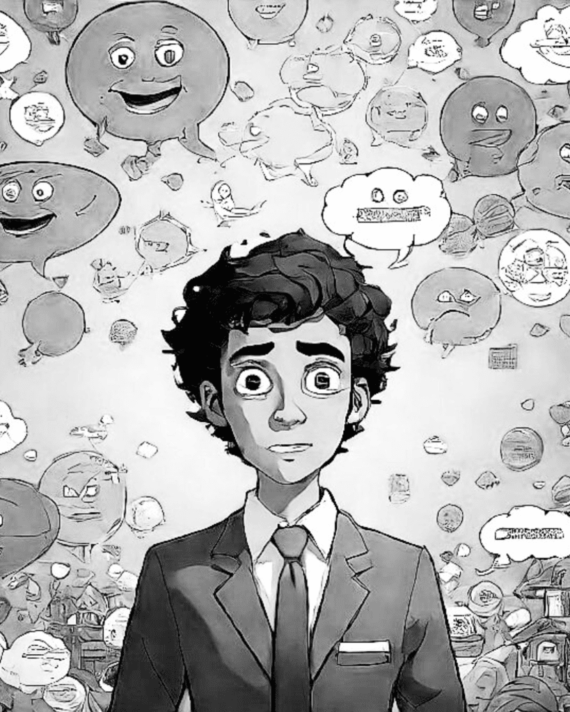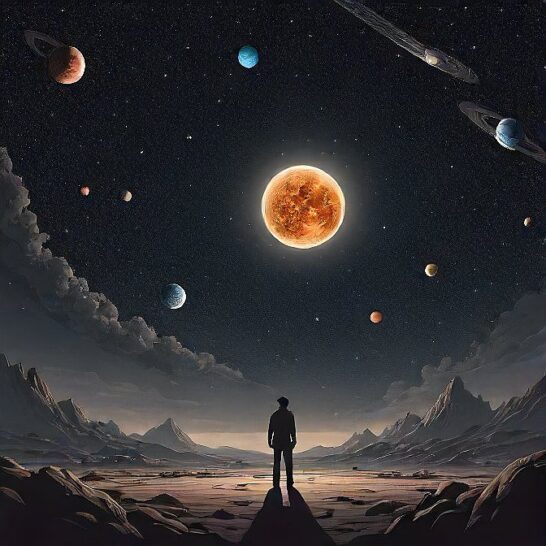Why Bad Shit Happens to Me. A Millennial’s Reflection
For me, questions like “Why do bad things happen to good people?”, “why me?” and alike are just wrong and flawed.
It reeks of subconscious entitlement.
Dare I say, it’s the ego’s favorite question.
To me, it’s a sign that whoever is asking this question doesn’t have a solid meaning in their life.
Asking why misfortune comes knocking on you is like a gambler wondering why he can’t beat the house simply by playing by the rules!
The hard truth?
Bad or unfortunate things will still happen to you and me even if we spend most of our lives solving world-level problems.
Ultimately, an existential housefire can and will burn us all to the ground, saints and jerks alike.
As far as I can tell, here’s the real question that needs asking:
Why are we so surprised when bad things happen, regardless of our moral standing?
Perhaps it’s because we crave a world that rewards virtue with sunshine and lollipops.
But that predictable existence would be as dull as watching paint dry.
Because let’s be honest, your life without a few bruises wouldn’t be much of a story at all, would it?
And for what it’s worth, there is no such universe.
So, what to do here?
Is there a way to go about this question?
How can we find a reasonable answer to help us go through this life?
I’m attempting to solve this in this short post.
I’ll cover a few ideas that we use to make sense of this and some controversial feedback on each.
After that, I’ll offer a very radical framework that you might never heard of before that could be the key to all of this.
Warning ahead: This will ruffle some feathers, so keep your eyes up!!
Who knows, we might upgrade our self-awareness by the end of this to a degree.
Let’s get started.

‘Why Me’. A Truth You Probably Never Heard Before
You’re scrolling through social media seeing many feel-good videos of volunteers and activists making a difference.
Then suddenly, you see a post about how your high school friend who started that awesome non-profit just got diagnosed with cancer.
It’s a total gut-punch.
Seeing your good people suffer such a tragedy like this can make you feel confused and hopeless.
“How could someone who is devoting his life to helping others get dealt such a cruel injustice”? you might say.
The opposite is true as well.
We look around and we see many terrible people get away with their misconducts and have a great life as if nothing has happened.
Once again, let me restate an objective claim:
The hard truth is that the universe doesn’t operate with us in mind
Look, we were sold a pack of lies from the culture we came up in.
Be a good person, follow your passions, and life will line up in your favor.
The bitter awakenings pile up until you’re forced to integrate an unfiltered reality:
Playing by the rules doesn’t immunize you from hardship.
Your integrity doesn’t buy you safer passage through the chaos.
Sadly, that path has always been a fantasy sold to you and me.
I’m not saying you should drop your morals and ethics here but you get my point.
Diseases, natural disasters, violence and all the causes of human suffering are random, uncontrolled forces.
Obviously, that doesn’t apply to someone who is actively trying to hurt you.
These forces don’t check unfortunately our good deeds and then decide whether to spare us or not.
This feels totally unfair.
So to cope with this, I see that many of us may resort to a few things in order to find some comfort during such times.
For example, you may turn to religion to make sense of this.
If you’re Christian or Muslim, you may say it’s “God’s plan,”.
Or if you’re a Buddhist, you may see this suffering as part of a cycle to reach enlightenment.
(Yes, suffering is key in our life for progress and change. I’m not against that, I’m simply tackling the coping mechanism here).
But let me play the devil’s advocate and respond to such teachings.
If that’s all true, I still believe it’s hard to understand why a truly loving God or cosmic force would willingly let good people suffer needlessly.
However, if that’s working out for you when you face a hard time, then so be it really even if doesn’t make sense to anyone else.
But what about those who are atheists or agnostics?
What to do if none of this makes sense to you if you are one?
Here, the ideas are so different.
As an atheist myself and without diving too much into it, usually the conversation to make sense of this goes something like this:
Religious Perspectives
- It’s a test of faith. Our suffering builds spiritual fortitude and surrender to God’s greater plan that we cannot fully comprehend.
- Our souls chose their challenges before incarnating.
Suffering, while difficult, is part of the journey. - Pain helps shed our ego and negativity away and make us close to the divine.
- It gives us the chance to practice compassion, empathy and selflessness.
- It develops our wisdom and virtue and offers a fuller appreciation for life’s gifts.
Non-religious Perspectives
- There is no God. And no one knows that for sure.
The universe is inherently chaotic and has no intent.
Good and bad events happen to us through random chance. - If God exists, it is indifferent.
Even if he might have created the universe, it does not mean he’d actively intervene or pass moral judgments on us. - Diseases, natural disasters, violence come from deterministic physical processes, not a willful cosmic force.
- Suffering is a biological byproduct.
Our suffering comes from the neural circuitry of evolutionary processes, not judgment. - People made God just to make sense of things they can’t understand.

Now, let’s shift gears to another perspective.
If you happen to ignore all of that, philosophy might be something you use at such time.
Philosophers like Marcus Aurelius suggest that change is constant.
All that matters is how we respond with virtuous thoughts and actions, no matter what happens.
This mindset helps, but is easier said than done when dealing with trauma.
As he put it:
“It’s silly to try to escape other people’s faults.
They are inescapable.”
I also noticed that what makes such times harder is our mind.
Our minds have a hard time accepting there’s no deeper meaning when good people suffer.
We instinctively look for someone or something to blame because of random chance.
We are wired to find patterns and believe we get what we deserve, even when that’s not true.
That’s also why we feel angry and confused when good deeds don’t lead to good outcomes.
I think you’re staring to see where I’m going with this.
And finally, the last angle I saw some rely on at such time is manifestation.
Basically, manifestation teaches us that our thoughts and beliefs have the power to shape our experienced reality.
It helps us to set clear goals, become more present and grateful and motivated for actions.
Ok, we know that.
From this vantage point then, you and I could argue an idea.
The idea is:
if our thoughts are good, then we shouldn’t suffer if we just think positively and manifest that right?
If we do just that and still end up in troubles or misfortunes, then something is going on here.
So, there must be some subconscious resistance, fear, or limiting belief within us that prevent us from manifesting what we desire.
If we just ‘namaste’ our way as hard as possible, then we can reach a good thing eventually.
Right?
Well, as much as I agree with the fact that the types of thoughts we have determine our actions, the idea is missing something.
What’s missing is that manifestation when confronted with extreme cases of misfortune, it falls apart.
Here’s an example:
If a baby was born with severe illness or disfigurement, does that mean she is suffering aa a result of not mastering her manifestation abilities well enough?
Could it be that her mother during pregnancy didn’t spend enough time manifesting beauty magazines and all the hot Jennifer Conelleys out there onto her unborn child?
It doesn’t make sense whatsoever!
So, I’ve come to some conclusions.
One of them is that whether we like it or not, the harsh reality about reality is:
The universe operates by laws of physics, probability, and causality that don’t bend to your personal desires nor mine.
We just have to do what we have to do to maximize our luck and chances that will make things operate or fall accordingly.
Ok, let’s take a breath.
Now that we covered some perspectives, we are at a crossroads and we might ask questions like:
>> What to do here?
>> Do you believe this or that?
>> How to make this make sense?
This is the part where the truth I mentioned earlier comes in.
I believe the deepest wisdom is to radically accept that the fairness of the universe was never guaranteed.
In other words:
To accept that no one is automatically owed good fortune just for being virtuous.
Acting with integrity should be its own reward, regardless of what happens to us in life.
I think this serves us in two ways:
- this would make our suffering feel less like a personal injustice from the universe or God or relevance.
- honor our courage to act and behave ethically.
Then, instead of confusion when storms hit us, we can find solidarity in shared fragility instead of resentment.
That desperate fantasy of virtue fast-tracking a hurdle-free heroic journey was always just your ego’s desperate survival tactic.
One that poisoned you and me to the very heart and left us unequipped when life hit hard.
Now, I have yet to reach the highest state of my self-awareness (no one would I’d say).
So I do know that practicing this radical perspective takes real mental strength that’s understandably difficult for you and me.
But I think if you attain it, you’ll find an empowering inner freedom.
One which illness, tragedy, or unfairness can never disturb as hard if otherwise.
Because in the end, the true “reward” for us being good is to simply live with authentic virtue and strive to be better.
Everything else, fair or unfair, is just the random chaos of a universe or a God or whatever you choose that we were never entitled to control.
The deeper “magic” then may be to develop unshakeable resiliency, wisdom and compassion when life’s inherent unfairness touches us all.
For at our core, we are not owed any cosmic immunity from pain simply for being good people.
We can only aim to meet each experience with grace, progressive thinking, and patience.
Thanks for reading!
What do you think about this topic? Do you agree or disagree with my thoughts?
Let me know in the comment section.
Until next time 🙂



